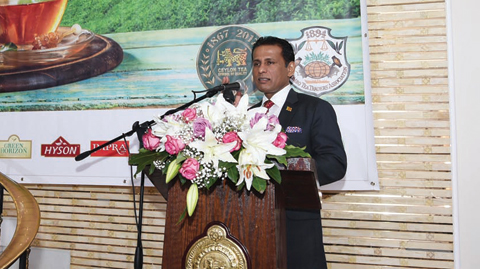 KUWAIT: Sri Lankan ambassador to Kuwait Kandeepan Bala speaks during a tea party held at the embassy. - Photo by Yasser Al-Zayyat
KUWAIT: Sri Lankan ambassador to Kuwait Kandeepan Bala speaks during a tea party held at the embassy. - Photo by Yasser Al-Zayyat
KUWAIT: According to the Sri Lankan ambassador to Kuwait, people in the state consume an estimated 5.5 to 6.0 million kilograms of tea annually. "This reflects a high per capita tea consumption. Ceylon Tea enjoys a strong market share of about 50 percent, maintaining its leadership," Kandeepan Bala said during a tea party at the embassy to celebrate 150 years of the Sri Lankan tea industry (Ceylon Tea) at the ambassador's residence in Salwa. The ceremony was attended by dignitaries and a host of people from various communities.
Tea parties were organized by the Colombo Tea Traders Association and the Sri Lanka Tea Board jointly with embassies all over the world with the help of the Sri Lankan ministry of foreign affairs. Sri Lanka is the world's largest exporter of tea and is delighting tea drinkers in almost 150 countries.
"Kuwait has one of the highest per capita GDP in the world, while up to two-thirds of the population in Kuwait is made up of foreign expatriates, dominated by South Asians," Bala explained. "As such, the tea market is broadly classified into the orthodox specialty type Ceylon Tea, which is popular among our Arab friends, and the mass scale CTC type usually consumed by most South Asians. We are grateful to Kuwait for being the leading patrons of Ceylon Tea and the trust they have in it," he added.
"The Global Ceylon Tea Party" was organized at Sri Lankan diplomatic entities in 37 countries, while partner tea companies, cafes and homes across the globe hosted similar parties on July 6. Locations in up to 50 countries, with populations in excess of half the world, celebrated this unprecedented event to set a world record for the largest and longest global tea party ever. Historically, in 1867, an enterprising Scotsman named James Taylor, respected as the "Father of Ceylon Tea", pioneered the commercial cultivation of this "green gold" in Sri Lanka, formerly known as Ceylon. Today, Sri Lanka's tea industry has retained the world renowned Ceylon Tea identity due to its global recognition.
By Ben Garcia

